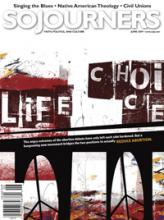Asked what he considered the most pressing problem in the American church, one seminary president offered a one-word response: “Literalism.” His diagnosis bears reflection. How we read is immensely consequential, since we rely on a sacred text as a means of connection with a living God. When Luther insisted on “sola scriptura” as a corrective to abuses of ecclesiastical authority, he opened up not only the richest conversation in history for the priesthood of believers, but also a large can of worms.
As literary critic George Steiner points out, Hebrew is one of the most ambiguous languages on earth. And Greek draws distinctions that do not survive translation. And the cultural assumptions of the ancient folk who sat on a hillside and heard the Beatitudes differ from ours profoundly. It takes careful, ongoing scholarship to help us imagine how they heard what they heard.
Sadly, hermeneutical criteria become lines in the sand, partitioning the family of God into camps where we huddle among the like-minded, clinging to readings we have come to rely on. Literalists warn their children away from the slippery lot who invoke words like “myth” and “metaphor” with alarming frequency. The latter often take refuge in the comforts of their learning and lose something childlike and open-hearted in the course of “higher” critical debate. Part of our work together is to provide a safe space for that debate, and then to have the courage to have it.
Read the Full Article

